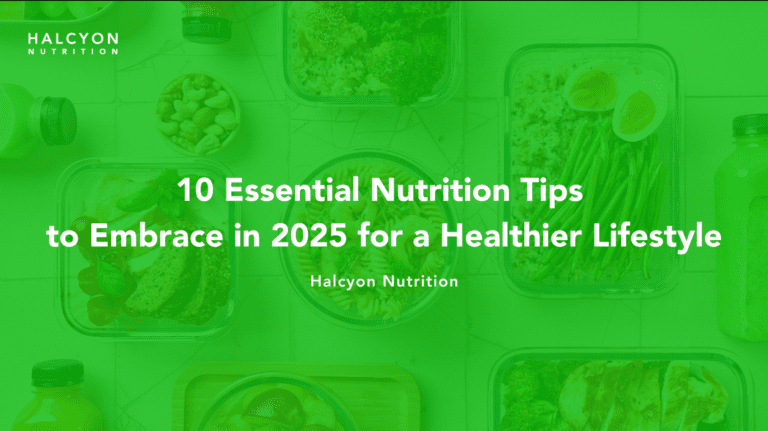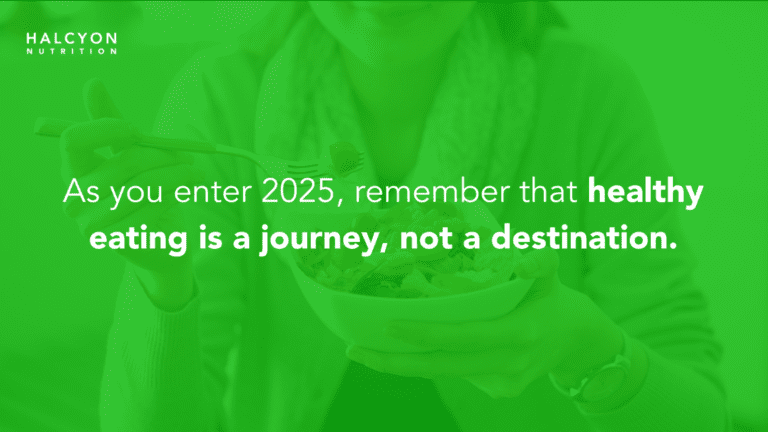10 Essential Nutrition Tips to Embrace in 2025 for a Healthier Lifestyle

As we step into 2025, many of us are reflecting on how we can improve our health and well-being.
Nutrition plays a crucial role in how we feel, think, and live. The new year is a perfect time to rethink our eating habits and set achievable goals for better health. Whether you’re looking to lose weight, boost energy, or simply eat more mindfully, these 10 nutrition tips, backed by science, will help you embrace a healthier lifestyle.

1. Adopt the Mediterranean Diet: A Time-Tested Way to Eat
One of the most researched and celebrated diets over the past few decades is the Mediterranean Diet. This way of eating is centered on fruits, vegetables, whole grains, legumes, olive oil, nuts, and seeds. Studies consistently show that it’s one of the healthiest ways to eat, offering numerous benefits for heart health, weight management, and even mental clarity.
The Mediterranean Diet is rich in healthy fats from olive oil and nuts, which are known to reduce the risk of heart disease. It’s also high in fiber, which supports digestion and helps regulate blood sugar levels. If you’re new to this diet, don’t worry about making drastic changes overnight. Start by incorporating more plant-based meals into your week, using olive oil as your primary cooking fat, and swapping out red meat for lean proteins like fish and legumes.
You don’t have to overhaul your entire diet at once. Start small by adding more vegetables to your plate and gradually reducing processed foods.
2. Embrace the Power of Breakfast
Many of us skip breakfast, thinking it will help us lose weight or save time in the morning. However, skipping breakfast can have negative consequences, such as lower energy levels, difficulty concentrating, and overeating later in the day. A balanced breakfast can set the tone for the rest of your day and help regulate your metabolism.
Aim for a breakfast that includes protein, fiber, and healthy fats. This combination keeps you fuller for longer and provides a steady stream of energy throughout the morning. Consider options like oatmeal with nuts and fruit, a vegetable-packed omelet, or a smoothie with yogurt, spinach, and chia seeds.
Remember, breakfast doesn’t have to be complicated. Simple meals that you can prepare in advance, like overnight oats or a boiled egg with whole-grain toast, are excellent choices that don’t take up much time.
3. Focus on Gut Health: It’s the Foundation of Your Well-being
The health of your gut is intricately connected to your overall health. A balanced gut microbiome plays a role in digestion, immune function, and even mental health. Research shows that the foods you eat can influence the balance of good and bad bacteria in your gut.
To keep your gut healthy, prioritize fiber-rich foods like vegetables, fruits, whole grains, and legumes. These foods feed the beneficial bacteria in your gut and help maintain digestive health. Additionally, fermented foods like yogurt, kimchi, sauerkraut, and kefir introduce live cultures that promote a healthy gut microbiome.
If you’re not used to eating a lot of fiber, increase your intake gradually to avoid digestive discomfort.
To know more about the importance of gut health to our overall well-being, check out this post: Should You Listen to Your Gut?
4. Beware of Diet Fads: Focus on Sustainable Habits
Every year brings a new wave of trendy diets, but the truth is, most of these are unsustainable in the long run. From juice cleanses to restrictive low-carb plans, these diets often promise quick results but can leave you feeling deprived and frustrated.
Instead of jumping on the latest fad, focus on making sustainable changes to your eating habits. This could mean reducing your intake of processed foods, eating more whole foods, or simply learning to listen to your body’s hunger cues. Sustainable changes will help you achieve long-term health goals without feeling deprived or stressed.
Remember, moderation is key. Enjoy your favorite treats occasionally, but focus on balance and consistency for lasting health benefits.
5. Enjoy Sweetened Beverages in Moderation
Sugar-sweetened beverages, such as sodas, sweetened coffee drinks, and energy drinks, are a major source of empty calories. These drinks can contribute to weight gain, increase the risk of type 2 diabetes, and promote inflammation in the body. Limit your intake of added sugar to about 50 grams or 12 teaspoons per day for a 2000 calorie diet to reduce these risks.
Instead of sugary drinks, hydrate with water, herbal teas, or infused water with slices of fruit. If you crave something sweet, try adding a splash of lemon or a few mint leaves to your water. For coffee, skip the sugary syrups and opt for black coffee or a splash of unsweetened almond milk.
Cutting out sugary beverages is one of the easiest ways to improve your nutrition and reduce your calorie intake.
6. Don’t Rely on Protein Bars: Whole Foods are Better
Protein bars have become a popular snack for people on the go, but many of them are loaded with sugar and artificial ingredients. While they may offer a quick protein fix, they’re not as nutritious as whole food sources of protein.
Instead of relying on protein bars, try getting your protein from whole foods like yogurt, eggs, beans, lentils, or nuts. These foods provide additional nutrients like fiber, healthy fats, and vitamins that protein bars often lack. For a quick snack, try pairing a handful of nuts with a piece of fruit, or enjoy a small bowl of Greek yogurt with a sprinkle of chia seeds.
7. Blend Your Fruits and Vegetables – It’s Still Nutritious
Smoothies are a convenient way to consume a variety of fruits and vegetables in one meal. There’s a misconception that blending fruits and veggies destroys their nutrients, but research shows that the blending process doesn’t significantly affect the nutritional value. In fact, smoothies can be a great way to increase your intake of vitamins, minerals, and fiber.
To make your smoothie more balanced, add protein-rich ingredients like Greek yogurt, chia seeds, or a scoop of protein powder. You can also sneak in leafy greens like spinach or kale for an extra boost of nutrients without compromising the taste. Just be mindful of the sugar content in fruit-heavy smoothies; adding a variety of vegetables can help balance the sweetness.
8. Don’t Overdo the Dark Chocolate: Enjoy in Moderation
Dark chocolate has long been touted for its health benefits, thanks to its high antioxidant content. However, some varieties of dark chocolate contain high levels of lead and cadmium, heavy metals that can be harmful when consumed in large quantities.
While you don’t have to give up dark chocolate entirely, it’s best to enjoy it in moderation. Aim for no more than an ounce a day to keep your risk low. Look for high-quality dark chocolate with at least 70% cocoa, as it contains more antioxidants and less sugar than lower-percentage varieties.
9. Incorporate Tofu and Other Plant-Based Proteins
Tofu and other soy-based products have long been a staple in plant-based diets. While some people once worried about the estrogen-like compounds in soy, recent research has dispelled these myths. In fact, studies show that consuming soy can offer a range of health benefits, including a reduced risk of heart disease and certain types of cancer.
Tofu is an excellent source of protein, calcium, and iron, and it’s versatile enough to be used in both savory and sweet dishes. Try incorporating tofu into stir-fries, salads, or even smoothies for a plant-based protein boost. Other plant-based protein sources include lentils, chickpeas, quinoa, and tempeh.
10. Set Realistic Nutrition Goals for Long-Term Success
It’s easy to get overwhelmed by the idea of completely overhauling your diet. But the key to lasting success is setting realistic, achievable goals. Start small by incorporating more vegetables into your meals or reducing your intake of processed foods. Gradually increase your goals as you feel more confident in your abilities.
Nutritionist Cynthia Sass recommends setting a few specific goals rather than trying to change everything at once. Focus on the positives — eating healthier will make you feel better, give you more energy, and help you maintain a healthy weight. Celebrate small victories along the way to stay motivated and committed to your health journey.
Additional Tips for Maintaining Healthy Eating Habits
✔ Make time for meals: Skipping meals can lead to overeating later in the day. Try to eat every 3–5 hours to keep your metabolism steady and avoid extreme hunger.
✔ Plan your meals: Preparing meals in advance can save you time and reduce the temptation to reach for unhealthy options. Batch cook meals or prep ingredients for the week to make healthy eating easier.
✔ Stay hydrated: Water is essential for digestion, metabolism, and overall health. Aim for at least 8 cups of water a day, and more if you’re active or in a hot climate.
✔ Track your progress: Keep a food diary or use a nutrition app to track your meals and progress. This can help you stay accountable and identify areas for
improvement.
✔ Don’t be too hard on yourself: It’s normal to indulge every once in a while. The key is moderation and getting back on track after enjoying a treat.
Nutrition is not about perfection; it’s about progress
The most effective way to improve your eating habits is by making small, sustainable changes that you can maintain for the long term. Whether you’re embracing the Mediterranean diet, focusing on gut health, or cutting out sugary drinks, the key is to set realistic goals and build habits that support your overall well-being.

HALCYON NUTRITION
offers personalized nutrition consultations to guide you every step of the way.
Partner with us throughout the year to create a sustainable plan tailored to your unique goals and lifestyle.
Together, we’ll make 2025 your healthiest year yet.
0918 488 3812 (SMART) or 0916 335 3909 (GLOBE)
hello@myhalcyonnutrition.com
222 Sen. Gil Puyat Ave., Makati City 1230, Metro Manila, Philippines
Sharing is caring!


